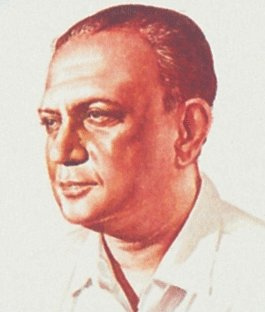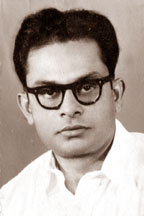
Sri Lankabhimanya Ranasinghe Premadasa was the third President of Sri Lanka from 2 January 1989 until his assassination in 1993. He also served as Prime Minister of Sri Lanka from 6 February 1978 to 2 January 1989. This makes Premadasa the longest-serving uninterrupted Prime Minister of Sri Lanka, having served in the post for nearly 11 years. He was the first person to be conferred with Sri Lanka's highest civilian award, the Sri Lankabhimanya in 1986 by President J. R. Jayewardene.

The United National Party is a centre-right political party in Sri Lanka. The UNP has served as the country's ruling party, or as part of its governing coalition, for 38 of the country's 74 years of independence, including the periods 1947–1956, 1965–1970, 1977–1994, 2001–2004 and 2015–2019. The party also controlled the executive presidency from its formation in 1978 until 1994 and again from 2022 to 2024.

The Parliament of the Democratic Socialist Republic of Sri Lanka is the supreme legislative body of Sri Lanka. It alone possesses legislative supremacy and thereby ultimate power over all other political bodies in the island. It is modeled after the British Parliament. The 17th Parliament of Sri Lanka will convene for the first time on 21 November 2024.

Sri Lankabhimanya Karu Jayasuriya is a Sri Lankan politician. He was the Speaker of the Parliament of Sri Lanka. Previously he was Mayor of Colombo from 1997 to 1999, Minister of Power and Energy from 2001 to 2004, Minister of Public Administration and Home Affairs from 2007 to 2008, and Minister of Buddha Sasana, Public Administration, and Democratic Governance in 2015. He has served as Chairman of the Leadership Council of the United National Party (UNP), as well as Deputy Leader of the UNP. He is a member of parliament representing the Gampaha District since 2001. He had served as Sri Lanka's Ambassador to (Germany). As Speaker of Parliament, he also acts as Chairman of the Constitutional Council.

Maithripala Senanayake was a Sri Lankan politician and Governor of the North-Central province. He first studied at St. Joseph's College, Anuradhapura then at St. John's Jaffna, where he attained a mastery in the Tamil Language and later at Nalanda College Colombo.

The Speaker of the Parliament of the Democratic Socialist Republic of Sri Lanka is the presiding officer of the chamber. The Speaker fulfills a number of important functions in relation to the operation of the House, which is based upon the British Westminster parliamentary system. The speaker is second in the Sri Lankan presidential line of succession, after the prime minister.
The Order of Precedence in Sri Lanka the protocol list at which Sri Lankan government officials are seated according to their rank. This is not the list of succession.

Murugesu Sivasithamparam was a leading Sri Lankan Tamil politician, Member of Parliament and Deputy Speaker.

Sir Razik Fareed, OBE, JP, UM, also known as A. R. A. Razik, was a Ceylonese landed proprietor, politician and philanthropist. He was the former Cabinet Minister of Trade, Senator, member of parliament and the state council. He had also served as Ceylon's High Commissioner to Pakistan.
The 14th Parliament of Sri Lanka was a meeting of the Parliament of Sri Lanka, with the membership determined by the results of the 2010 parliamentary election held on 8 and 20 April 2010. The parliament met for the first time on 22 April 2010 and was dissolved on 26 June 2015.
The 11th Parliament of Sri Lanka was a meeting of the Parliament of Sri Lanka, with the membership determined by the results of the 2000 parliamentary election held on 10 October 2000. The parliament met for the first time on 18 October 2000 and was dissolved on 10 October 2001.
Srikumaradas Charles Shirley Corea was a Sri Lankan politician. He was the 9th Speaker of the Parliament and a Member of Parliament, representing Chilaw. He was a member of the United National Party of Sri Lanka.
The Rajapaksa family is a Sri Lankan family that is prominent in politics. It was one of Sri Lanka's most powerful families during Mahinda Rajapaksa's presidency, when many members of the family occupied senior positions in the Sri Lankan state. They have been particularly prominent in Sri Lankan national politics since 2005 when Mahinda Rajapaksa was elected president.

Warnakulasuriya Ichchampullige Hugh Fernando was a Sri Lankan politician born in Nainamadama. He was the Speaker of the Sri Lankan Parliament.
The 19th Amendment (19A) to the Constitution of Sri Lanka was passed by the 225-member Sri Lankan Parliament with 215 voting in favor, one against, one abstained and seven were absent, on 28 April 2015. The amendment envisages the dilution of many powers of Executive Presidency, which had been in force since 1978. It is the most revolutionary reform ever applied to the Constitution of Sri Lanka since JR Jayawardhane became the first Executive President of Sri Lanka in 1978.
The 15th Parliament of Sri Lanka was the meeting of the Parliament of Sri Lanka with its membership determined by the results of the 2015 parliamentary election, held on 17 August 2015. The parliament met for the first time on 1 September 2015 and was dissolved on 3 March 2020.
The 3rd Parliament of Ceylon was a meeting of the Parliament of Ceylon, with the membership determined by the results of the 1956 parliamentary election between 5 and 10 April 1956. The parliament met for the first time on 19 April 1956 and was dissolved on 5 December 1959.
Ibrahim Adaham Abdul Cader, known as I. A. Cader was a Sri Lankan lawyer and member of the Parliament of Sri Lanka.
Suriarachchi Kankanamalage Karunadasa Suriarachchi was a Ceylonese politician.









